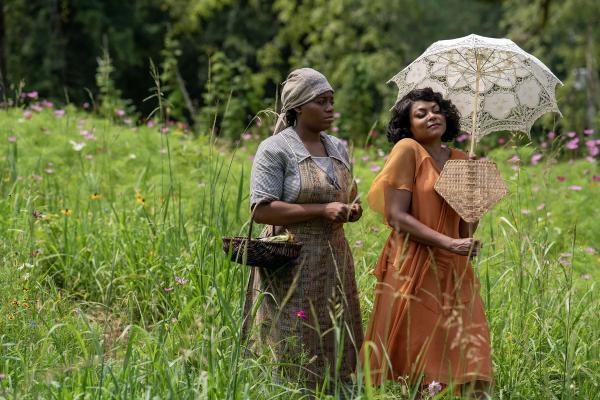In the 1992 preface to the reprint of the novel The Color Purple — recently adapted into a musical film — Alice Walker writes of the text as a “theological work.” With this theological work, Walker wanted “to explore the difficult path of someone who starts out in life already a spiritual captive, but who, through her own courage and the help of others, breaks free into the realization that she, like Nature itself, is a radiant expression of the heretofore perceived as quite distant Divine.” Alice Walker, like the womanist theologians who draw on her works, is interested in redefining God for Black women, challenging the perception of God promoted by Western white Christianity. She does this through the life of the main character, Celie.
Set sometime in the 1900s in the rural South, The Color Purple traces Celie’s life from age 14 when her stepfather rapes her, resulting in her first pregnancy, until her sister Nettie and her now-adult children return from their work as missionaries in Africa. At the start of the book, Celie is a “good girl” who writes letters to God, serves faithfully in church, does whatever the men in her life tell her to do; she has no sense of what she desires and what brings her pleasure. The pivot comes when she gives up on God as she knows him, writing in a letter to her sister, “Dear Nettie, I don’t write to God no more. I write to you…”
Yet, with the help of Shug, a blues singer who is both Celie’s husband’s mistress and Celie’s eventual lover, Celie realizes that this God who has failed her is “the old white man” God from “the white folks’ white bible.” Shug introduces her to a God who loves her regardless, “is inside [her] and inside everybody else,” “is everything,” and takes pleasure in our pleasure, including sexual pleasure. By the end of the book, Celie is confident, self-assured, loved by herself and those around her, and running her own pants store. At its core, The Color Purple is the story of Celie finding God, finding love, and finding herself.
But I can’t discuss The Color Purple without acknowledging recent antisemitic and transphobic comments by its author, Alice Walker. Even though Walker’s ex-husband and daughter are Jewish, Walker has promoted the work of David Icke — whose antisemitic claims include conspiracy theories that the Holocaust potentially didn’t happen, and that Jewish people are secretive reptilian rulers and members of the Illuminati. Walker also penned support for Harry Potter author J. K. Rowling, who, in her public transphobic comments, has argued that trans women are not women, challenged the use of pronouns and inclusive language, and promoted other harmful claims around sex and gender. In her essay, Walker appeals to Rowling’s critics as an “Elder,” and writes that we shouldn’t be “tampering” with the “miracle” of the human body as it relates to gender and sex.
In her support of Icke and Rowling, Walker seems to have lost sight of her own claims about God and humanity that are revealed in The Color Purple and other works. If, as Shug says, “God is inside you and inside everybody else,” then we must fight transphobia, homophobia, antisemitism, Islamophobia, colonialism, racism, sexism, and all forms of oppression and exploitation that would violate the divine within those around us. This includes pushing back against Walker’s own antisemitic and transphobic comments and actions. We have an opportunity to lean into the words of Blitz Bazawule, the director of the new musical film adaptation of The Color Purple: As millennials and Gen Zers, we can “expand upon what the ancestors blessed Alice Walker with” and bring “something new to it.” We can reimagine a vision of healing and liberation rooted in the God that is found in all of us, including those who have been harmed by Walker’s words and actions.
In this way, The Color Purple is a story — a theological work — that has begun to exist beyond Walker. Like scripture, it is a living and breathing text that can be interpreted to reflect the concerns of the contemporary moment. And as such, its newest musical film adaptation sheds new light on the theme of sisterhood and offers a new lesson about God. Where the book emphasizes Celie’s journey of coming to know a sense of God that is different than the distant white man God that she has grown up believing in, the Black women characters in the musical maintain their relationship with God, understanding God as always at work in their situations.
While Celie questions why “God don’t give ‘em [her children] back” when her father takes them away, she later sees her daughter at the store and breaks out into a song new to the film adaptation: “Oh the Lord don’ send me a sign. Oh, I know she be mine.” God’s presence in her life is affirmed with this sign.
Shug Avery comes to know God in a way that affirms her career as a blues singer despite the concerns of her father, who is a pastor in both the recent musical and 1985 film adaptation. Shug shares with Celie: “He ain’t forgave me for choosing the blues over his religion … God ain’t never left me. I reckon if he can understand … one day my Pa will.” While Shug’s father abandoned her, God never did.
When Sofia, the wife of Celie’s stepson Harpo, is imprisoned for slapping the mayor after the mayor’s wife disrespects her, Celie visits Sofia regularly, giving her food and updates about her family. Once she’s released and back with her family, she tells Celie, “That’s how I know there’s a God. Because he’s living in you.” Like Celie, her faith is tested but God is with her in the form of Celie. For the Black women in the film, God is present with them, and God is manifest through them in their relationships with one another. They do not have to reject God because they have a God who cares intimately for the lives of Black women, who has knitted their lives together and opened the doors for Celie, Sofia, and Shug to love themselves, choose themselves, and fight for their collective freedom.
Got something to say about what you're reading? We value your feedback!







